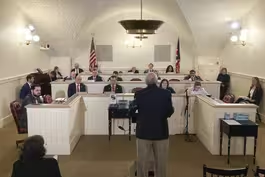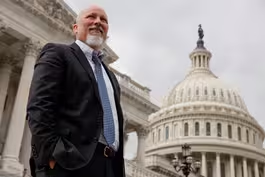
Proposed rules would force power plants to slash emissions
Clip: 5/11/2023 | 5m 17sVideo has Closed Captions
Proposed EPA rules would force power plants to slash carbon emissions
The Environmental Protection Agency laid out its latest move to cut the greenhouse gasses that are driving climate change, unveiling a sweeping new set of guidelines for the power plants that generate America's electricity. William Brangham reports.
Problems playing video? | Closed Captioning Feedback
Problems playing video? | Closed Captioning Feedback
Major corporate funding for the PBS News Hour is provided by BDO, BNSF, Consumer Cellular, American Cruise Lines, and Raymond James. Funding for the PBS NewsHour Weekend is provided by...

Proposed rules would force power plants to slash emissions
Clip: 5/11/2023 | 5m 17sVideo has Closed Captions
The Environmental Protection Agency laid out its latest move to cut the greenhouse gasses that are driving climate change, unveiling a sweeping new set of guidelines for the power plants that generate America's electricity. William Brangham reports.
Problems playing video? | Closed Captioning Feedback
How to Watch PBS News Hour
PBS News Hour is available to stream on pbs.org and the free PBS App, available on iPhone, Apple TV, Android TV, Android smartphones, Amazon Fire TV, Amazon Fire Tablet, Roku, Samsung Smart TV, and Vizio.
Providing Support for PBS.org
Learn Moreabout PBS online sponsorshipGEOFF BENNETT: Today, the Environmental Protection Agency laid out its latest move to cut the greenhouse gases that are driving climate change, unveiling a sweeping new set of guidelines for the power plants that generate America's electricity.
William Brangham has been covering this, and he joins us now.
Thanks for being here.
So, tell us more about this move today by the EPA.
What are they asking utilities to do?
And how does this fit within President Biden's climate agenda?
WILLIAM BRANGHAM: I mean, Geoff, this is the third major move that the administration has made to cut the greenhouse gas emissions, as you said, that are heating this planet to a dangerous degree.
The first was, last year, the passage of the Inflation Reduction Act.
Then, last month, the EPA issued these very strict rules on auto emissions.
And now, today, we have power plants.
The issue with generating electricity in this country is that that creates about a quarter of all of America's pollution.
So it's a big chunk.
And the EPA is saying to these power plants and utilities around the country, you have got to cut those emissions, and you have got to use existing technology.
And you have got to do it quickly by as up to 90 percent in the near future.
And the EPA says, if we do this, the air that we all breathe is going to be cleaner, and we're going to make a significant dent in the emissions that we're putting out that are causing climate change.
So, some environmentalists said the EPA needs to do more.
But many environmentalists today are cheering this move.
Earlier today, I talked to Manish Bapna.
He's the president and CEO of the Natural Resources Defense Council.
Here's what he had to say.
MANISH BAPNA, President and CEO, Natural Resources Defense Council: I mean, the urgency of the climate crisis cannot be overstated.
But what we have seen in the past year finally positions the United States to take a leadership role in tackling the climate crisis.
We have seen, truly, a historic triple play for climate action.
GEOFF BENNETT: So he's talking about the urgency, but how will these plants actually do that work, clean up their emissions?
WILLIAM BRANGHAM: There's several different ways.
The EPA is not saying, you have to use this particular type of technology.
In this conversation, it is worth noting that there is a true revolution going on in clean energy technology.
The costs of wind and solar and geothermal are just falling.
The venerable Wall Street firm Lazard just did an analysis recently, and they said that large-scale solar and wind utilities can go toe to toe economically now with the dirtiest, cheapest energy sources.
So, the economic argument is already being made.
For power plants, there's a couple of ways that they could do this, though.
They can mix in cleaner fuels.
They can burn clean hydrogen.
They can -- if the plant is really old, they can retire that plant.
Or they can use what's called carbon capture and sequestration, which is kind of a fancy way of saying, you just grab the carbon and stick it underground, where it doesn't cause any problems.
The tricky part is that CCS, as it's known, is not really being utilized anywhere in the United States.
GEOFF BENNETT: Really?
WILLIAM BRANGHAM: And so this is what the industry says is, look, EPA, you're asking us to use this very aggressive rule based in part on a technology that we think is not ready for prime time.
Earlier today, I talked to Scott Segal.
He's a lawyer who represents a lot of industry and power associates.
Here's what he said about this.
SCOTT SEGAL, Partner, Bracewell LLP: There is a very bright future for carbon capture and sequestration.
There are some big industrial projects, multibillion-dollar projects, being constructed, for example, in the Midwest, to deal with the emissions that come from biofuel production.
But in the power sector, there are very few examples of commercial scale application of CCS.
WILLIAM BRANGHAM: So, that is the industry's argument.
The EPA points to a working CCS factory in Canada that's been operating for 10 years very successfully.
They say this technology is ready.
GEOFF BENNETT: The EPA's climate moves have previously been challenged in court.
Do we expect that this time around?
WILLIAM BRANGHAM: A hundred percent.
It's a virtual lock that there will be legal challenges.
Most of those will be driven by industry and/or the Republican attorneys general, who very successfully sued the Obama Clean Power Plan several years ago and blocked that from happening.
So that will definitely happen.
You're also seeing a lot of industry critics coming out and saying this is going to be too costly for us, it's going to be too costly for consumers who want to plug in everything in their homes.
And there are also some criticisms within the Democratic Party itself.
Joe Manchin, the senator from West Virginia, whose state and whose own personal fortune is very dependent upon coal, called this a radical climate agenda.
Manchin said that these rules are trying to regulate the coal and gas plants out of existence.
So, lots of critics that are out there.
I think it is worth saying in this conversation, though, that the EPA didn't just capriciously decide to do this.
This is their mandate.
It is clearly -- the courts have held this up.
Legislation has held this up to say it is their duty to regulate carbon dioxide emissions.
How they do that, how aggressively they do that is definitely what's going to be fought over.
GEOFF BENNETT: Yes, that's interesting.
William Brangham, thanks so much for that reporting.
WILLIAM BRANGHAM: Thanks, Geoff.
Border officials prepare for migrants as order expires
Video has Closed Captions
Clip: 5/11/2023 | 3m 15s | Border officials prepare for surge of migrants as Title 42 immigration restrictions expire (3m 15s)
GOP works to block state amendments for abortion rights
Video has Closed Captions
Clip: 5/11/2023 | 7m 30s | Republicans work to thwart state constitutional amendments protecting reproductive rights (7m 30s)
Rep. Chip Roy on debt ceiling debate and border policy
Video has Closed Captions
Clip: 5/11/2023 | 6m 14s | Republican Congressman Chip Roy on debt ceiling debate and border policy (6m 14s)
Secretary of State on immigration policy as Title 42 ends
Video has Closed Captions
Clip: 5/11/2023 | 9m 43s | Secretary of State Blinken discusses U.S. immigration policy as Title 42 ends (9m 43s)
Town hall highlights media's struggle covering Trump's lies
Video has Closed Captions
Clip: 5/11/2023 | 8m 9s | CNN town hall highlights media's struggle with how to cover Trump and his lies (8m 9s)
Ukraine awaits arrival of U.S. tanks in fight against Russia
Video has Closed Captions
Clip: 5/11/2023 | 7m 20s | Ukraine awaits arrival of U.S. tanks that could be game-changer in fight against Russia (7m 20s)
Providing Support for PBS.org
Learn Moreabout PBS online sponsorship
- News and Public Affairs

FRONTLINE is investigative journalism that questions, explains and changes our world.

- News and Public Affairs

Amanpour and Company features conversations with leaders and decision makers.












Support for PBS provided by:
Major corporate funding for the PBS News Hour is provided by BDO, BNSF, Consumer Cellular, American Cruise Lines, and Raymond James. Funding for the PBS NewsHour Weekend is provided by...





